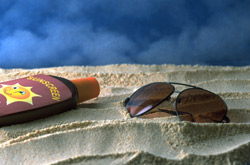Keep Kids Safe and Healthy This Summer
 It’s summertime! Be extra vigilant to prevent injury and keep your kids safe and healthy this summer.
It’s summertime! Be extra vigilant to prevent injury and keep your kids safe and healthy this summer.
Summer’s a great time to relax and have fun. Whether they are young children or teens, keep kids safe and healthy this summer, at home, play, while traveling, and wherever else they may be.
Swim safely
Swimming is one of the most popular recreational activities in the United States and the most popular recreational activity for children and teens (ages 7–17). Although swimming offers numerous health benefits, pools and other recreational water venues are also places where germs can be spread. Learn how to protect yourself and your kids from these germs and help prevent recreational water illnesses (RWIs).
Practice water safety and prevent drownings
Drownings are the leading cause of injury death for young children ages 1 to 4, and three children die every day as a result of drowning. Learn ways to prevent drowning, including:
- Always have supervision when in or around water
- Teach kids to swim
- Learn CPR
- Install a four-sided fence around home pools
Boat safely
Making boating safety a priority can ensure that it stays fun. Of the people who died in a boating incident in 2009, more than 7 out of 10 (73%) drowned. More than 90 percent of the people who drowned were not wearing a life jacket. Properly fitted life jackets can prevent drownings and should be worn at all times by everyone on any boat.
Keep cool in the heat
People who are at highest risk for heat-related illness are the elderly, the very young, and people with mental illness and chronic diseases. But even young and healthy people can get sick from the heat if they participate in strenuous physical activities during hot weather.
Never leave infants, children or pets in a parked car, even if the windows are cracked open. Dress infants and children in loose, lightweight, light-colored clothing. Learn more about heat-related illnesses. Take steps to prevent heat-related illnesses, injuries, and deaths during hot weather.
Protect kids from the sun
 Just a few serious sunburns can increase your child's risk of skin cancer later in life. Kids don't have to be at the pool, beach, or on vacation to get too much sun. Their skin needs protection from the sun's harmful ultraviolet (UV) rays whenever they're outdoors.
Just a few serious sunburns can increase your child's risk of skin cancer later in life. Kids don't have to be at the pool, beach, or on vacation to get too much sun. Their skin needs protection from the sun's harmful ultraviolet (UV) rays whenever they're outdoors.
Prevent concussions
There are things you can do to help lower the risks for concussion and other forms of traumatic brain injury. Concussions can occur in any sport or recreation activity. Most people with a concussion recover quickly and fully. But for some people, symptoms can last for days, weeks, or longer. In general, recovery may be slower among older adults, young children, and teens. Learn concussion signs and symptoms and what to do if a concussion occurs.
Play it safe on the playground
Each year in the United States, emergency departments treat more than 200,000 children ages 14 and younger for playground-related injuries. Falls on the playground are a common cause of injury. Check to make sure that the surfaces under playground equipment are safe, soft, and well- maintained (such as wood chips or sand, not dirt or grass).
Have a healthy home
Stay smart around the house. Get smart tips on fire prevention, microwave use, and living with pets. At a very young age, children develop the habits and behaviors that will influence their lifelong health. Get healthy home tips for each room in the house.
Prevent cyberbullying
Kids can use electronic media to embarrass, harass or threaten their peers through email, a chat room, instant messaging, a website (through blogs), or text messaging. Increasing numbers of teens and pre-teens are becoming victims of this new form of violence-electronic aggression. Keep close tabs on your child’s electronic activities.
Prevent teen dating violence
In the past 12 months, one in 10 teens report being hit or physically hurt on purpose by a boyfriend or girlfriend at least once. During the preteen and teen years, young people are learning skills they need to form positive relationships with others. This is an ideal time to promote healthy relationships and prevent patterns of dating violence that can last into adulthood.
More Information
- Family Health
- Air Quality Index (AQI) - A Guide to Air Quality and Your Health
- Animal Exhibits
- Camping
- Color Me Safe Coloring Pages
- Develop a Family Disaster Plan
- Healthy Pets
- Injury is the #1 Killer of Children
- Know Asthma Triggers [PDF - 2.15 MB]
- Nutrition, Physical Activity and Obesity
- Parent Portal
- Prevent Childhood Lead Poisoning
- Prevent Youth Violence
- Smoking: You(th) and Tobacco
- Sports Injuries
- Spring and Summer Outdoor Safety
- Stop bullying
- Talk to Your Kids about Tobacco, Alcohol, and Drugs
- Tips for Parents – Ideas to Help Children Maintain a Healthy Weight
- Tips to Prevent Poisonings
- Traveling with Children
- West Nile Virus
CDC works 24/7 saving lives and protecting people from health threats to have a more secure nation. A US federal agency, CDC helps make the healthy choice the easy choice by putting science and prevention into action. CDC works to help people live longer, healthier and more productive lives.
Get email updates
To receive email updates about this page, enter your email address:
Contact Us:
- Centers for Disease Control and Prevention
1600 Clifton Rd
Atlanta, GA 30333 - 800-CDC-INFO
(800-232-4636)
TTY: (888) 232-6348 - Contact CDC-INFO



